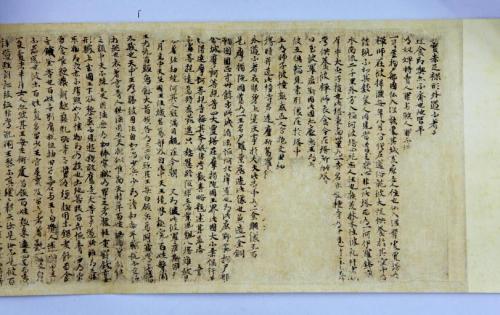In 1908, French archaeologist Paul Pelliot bought a pile of old documents from the famous Wang Yuanlu, who was the abbot of the caves in Dunhuang in Jiuquan, in China’s Gansu province.
Wang, who discovered the renowned Dunhuang manuscripts a cache of significant religious and secular documents from the 5th to early 11th centuries sold them to European visitors, totally unaware of their cultural value.
One of them was the very first travelogue on India written by a monk from Silla Kingdom (B.C. 57A.D. 935). Hyecho, born in 704 in Silla, moved to Tang Dynasty China when he was 16 years old. In the China, he studied esoteric Buddhism under Vajrabodhi, the famous Indian monk who was teaching his religious theories in Tang China. Following Vajrabodhi’s advice, Hyecho traveled to India, which he considered the “land of Buddha.”
During his four-year of journey, Hyecho wrote a travelogue in classical Chinese called “Wangocheonchukgukjeon,” meaning “Memoir of the Pilgrimage to the Five Kingdoms of India.” In a very concise yet vivid language, Hyecho describes cultural customs, local climate, languages and even political situations of India, Arabs, Persia and other Central Asian states.
Wang, who discovered the renowned Dunhuang manuscripts a cache of significant religious and secular documents from the 5th to early 11th centuries sold them to European visitors, totally unaware of their cultural value.
One of them was the very first travelogue on India written by a monk from Silla Kingdom (B.C. 57A.D. 935). Hyecho, born in 704 in Silla, moved to Tang Dynasty China when he was 16 years old. In the China, he studied esoteric Buddhism under Vajrabodhi, the famous Indian monk who was teaching his religious theories in Tang China. Following Vajrabodhi’s advice, Hyecho traveled to India, which he considered the “land of Buddha.”
During his four-year of journey, Hyecho wrote a travelogue in classical Chinese called “Wangocheonchukgukjeon,” meaning “Memoir of the Pilgrimage to the Five Kingdoms of India.” In a very concise yet vivid language, Hyecho describes cultural customs, local climate, languages and even political situations of India, Arabs, Persia and other Central Asian states.

For Jian, a renowned monk in Korea who recently published the newly-translated version of the manuscript, Hyecho’s reflective and nostalgic accounts of his home country Silla was what moved him the most.
“I’ve been visiting India many times for studying purposes since the 1980s,” he told The Korea Herald. “I first read the original text of Hyecho’s travelogue in the early 80s. And one of the poems he wrote made me feel like he and I were going through something similar, transcending the time difference being in a foreign country while missing home.”
“My country lies in the north/ but I miss it in the west corner of a foreign land,” Hyecho wrote. “No single wild goose can be found in warm India/ So who would ever visit the forest in my homeland?”
Aside from the poems, Hyecho wrote about naked Buddhist exercisers in India; how people in Tibet catch the lice in their fur clothes and eat them; the way people in Western India sung lyrically; and how Arabs do not bow like the way of Silla.
“Hyecho traveled to India on foot about 1,000 years ago,” said Jian. “It’s not something that’s so easy to do in these days either. In the 8th century, India was considered a place where ‘no one out of hundred visitors would return alive’ because of its many endemic diseases and natural differences from East Asia. He is a very, very unusual historical figure.”
“Though it’s short in length, there hasn’t been any other record of India written by a Korean person in the 8th century,” Jian continued. “There is a very lively feel to the whole travelogue. He’d written this in a very honest and realistic way.”
Ji-an, who has studied classical Chinese the lingua franca in the 8th century for over 40 years, translating the text wasn’t too challenging. “I just felt very honored to do it,” he said.
Hyecho died in China at the age of 83, after a lifetime of studying and teaching esoteric Buddhism abroad.
The original document is currently owned by the National Library of France. The manuscript will make its first trip to Korea this winter, 1,283 years after it was penned, on a temporary loan to the National Museum of Korea. The book will be on display in Seoul from from Dec. 18 to April 3 of next year.
By Claire Lee (clairelee@heraldcorp.com)










![[Today’s K-pop] BTS pop-up event to come to Seoul](http://res.heraldm.com/phpwas/restmb_idxmake.php?idx=644&simg=/content/image/2024/04/17/20240417050734_0.jpg&u=)





![[KH Explains] Hyundai's full hybrid edge to pay off amid slow transition to pure EVs](http://res.heraldm.com/phpwas/restmb_idxmake.php?idx=652&simg=/content/image/2024/04/18/20240418050645_0.jpg&u=20240419100350)

